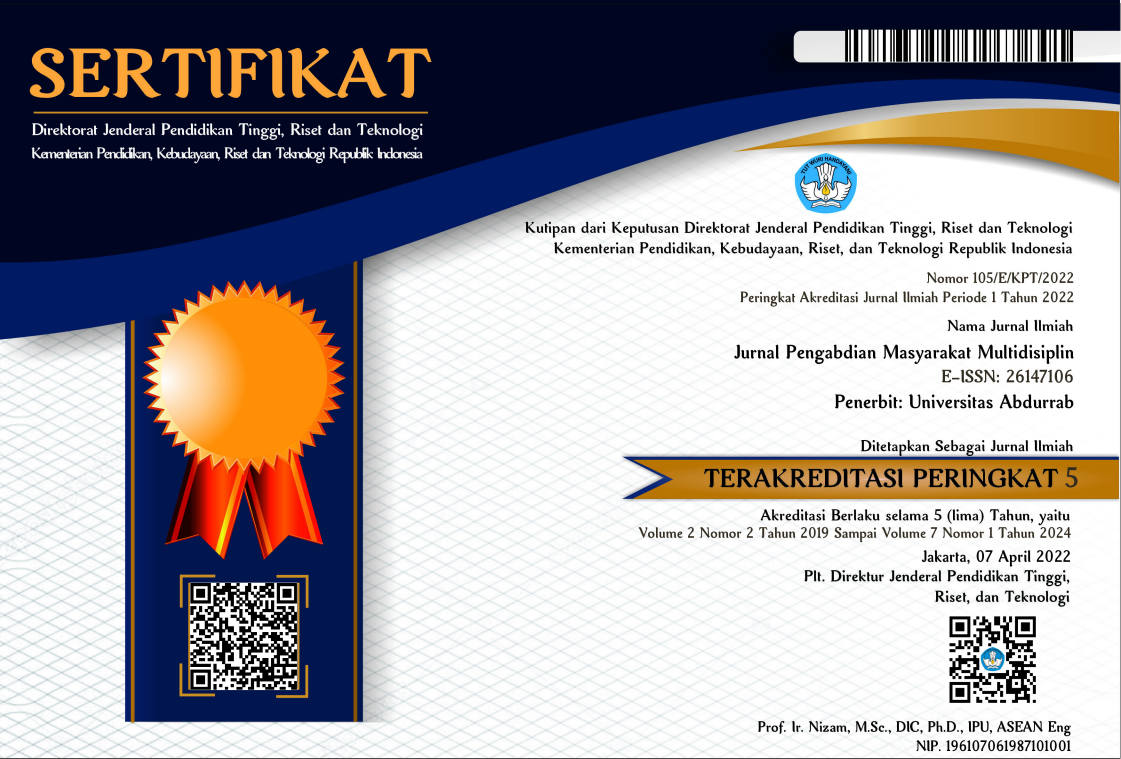PENTINGNYA KETERLIBATAN ORANG TUA DI LEMBAGA PAUD DALAM MENSTIMULASI PERKEMBANGAN SOSIAL EMOSIONAL ANAK USIA DINI
Abstract
There are still many parents who take their children to go to kindergarten institutions with the aim that their children can learn to read, write, count and be good at (reading) the Koran. Like what happened in Hauriyah Halum Integrated Kindergarten. Since the learning process is implemented, parents only fulfill all the needs of the children requested by the institution for the learning process including completing school administration. After that, the parents are only tasked with taking the child to school in the morning and picking up the child from school after the learning process, and sometimes asking how many stars the child's work got. Parents do not think at all about the child's behavior while at school, such as annoying friends, making noise during the learning process, hitting friends, and saying bad words to friends. This is often conveyed by the teacher every time the child comes home from school with the hope that the parents advise the child while at home. However, every day there is no visible change and even more protracted. For this reason, it is necessary to do counseling on the importance of parental involvement in kindergarten institutions in stimulating children's socio-emotional development from an early age. Therefore, it is necessary to carry out community service in the form of counseling. The extension method is in the form of lectures and questions and answers. This community service aims to ensure that teachers always involve parents in educating children, especially in stimulating children's social-emotional development from an early age. So that children can follow the learning process and behave well to teachers and friends while they are at school. As a result of this community service, it is hoped that all parents can train themselves or get used to behaving well in front of children at all times while at home as teachers have been accustomed to while the child is in school.
References
E. M. HM, “Mengelola kecerdasan emosi,” Tadrib, vol. 2, no. 2, pp. 198–213, 2016.
A. Syamsuddin, “Psikologi Pendidikan (Edisi Revisi),” Bandung: Remaja Rosda Karya,
F. Nurmalitasari, “Perkembangan sosial emosi pada anak usia prasekolah,” Bul. Psikol., vol.
, no. 2, pp. 103–111, 2015.
F. Mayar, “Perkembangan sosial anak usia dini sebagai bibit untuk masa depan bangsa,”
Al-Ta lim J., vol. 20, no. 3, pp. 459–464, 2013.
A. Priyanto, “pengembangan kreativitas pada anak usia dini melalui Aktivitas bermain,” J.
Ilm. Guru Caraka Olah Pikir Edukatif, no. 2, 2014.
K. Rani and M. N. Jauhari, “Keterlibatan orangtua dalam penanganan anak berkebutuhan
khusus,” J. Abadimas Adi Buana, vol. 2, no. 1, pp. 55–64, 2018.
F. F. Sufa and M. H. Y. Setiawan, “OPTIMALISASI PERAN ORANGTUA DALAM
MENGEMBANGKAN POTENSI PAUD,” Adi Widya J. Pengabdi. Masy., vol. 2, no. 2,
pp. 178–184, 2018.
F. Fahruddin and B. N. Astini, “Pelatihan Program Parenting untuk Meningkatkan
Profesionalisme Guru PAUD Di Kota Mataram Tahun 2018,” J. Pengabdi. Magister
Pendidik. IPA, vol. 1, no. 1, pp. 37–44, 2018.
S. Tambak, “Metode Ceramah: Konsep dan Aplikasi dalam Pembelajaran Pendidikan
Agama Islam,” J. Tarb., vol. 21, no. 2, pp. 375–401, 2014.
N. Huda, “Penerapan metode tanya jawab sebagai upaya meningkatkan keaktifan siswa
pada mata pelajaran fiqih kelas X IPA 3 MA Darussalam Krempyang Tanjunganom Nganjuk,” J. El-Barqie J. MA Darussalam, vol. 1, no. 1, pp. 141–162, 2020.
Copyright (c) 2021 Jurnal Pengabdian Masyarakat Multidisiplin

This work is licensed under a Creative Commons Attribution-NonCommercial-ShareAlike 4.0 International License.
1. Copyright of all journal manuscripts is held by the Jurnal Pengabdian Masyarakat Multidisiplin.Formal legal provisions to access digital articles of electronic journal are subject to the provision of the Creative
2. Commons Attribution-ShareAlike license (CC BY-NC-SA), which means that Jurnal Pengabdian Masyarakat Multidisiplin is rightful to keep, transfer media/format, manage in the form of databases, maintain, and
3. publish articles.Published manuscripts both printed and electronic are open access for educational, research, and library purposes. Additionally, the editorial board is not responsible for any violations of copyright law.
licensed under a Creative Commons Attribution-ShareAlike 4.0 International License.
 PDF (Bahasa Indonesia)
PDF (Bahasa Indonesia)
 Abstract views: 1195
Abstract views: 1195
 downloads: 1155
downloads: 1155

 :
:




